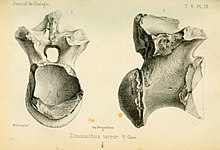Dinosuchus is a genus of extinct alligatorid crocodilian. It was very large compared to other alligatorids, save for the giant caiman Purussaurus and its closest relatives. The genus was first described in 1876 on the basis of a vertebra from the Brazilian Amazon, the type species being named D. terror.[2] In 1921, a new species of Dinosuchus, D. neivensis, was named based on a large mandible that was discovered in Colombia.[3] D. neivensis was later found to be synonymous with both Brachygnathosuchus braziliensis and Purussaurus brasiliensis, being reassigned in 1924 to the senior synonym P. brasiliensis.[4] In 1965, D. terror was proposed to be a nomen vanum.[5] In 1936, Robert Broom used the name Dinosuchus for a dinocephalian therapsid from South Africa.[6] Broom's Dinosuchus is now considered a junior synonym of Anteosaurus.[7]
| Dinosuchus | |
|---|---|

| |
| Scientific classification | |
| Domain: | Eukaryota |
| Kingdom: | Animalia |
| Phylum: | Chordata |
| Class: | Reptilia |
| Clade: | Archosauromorpha |
| Clade: | Archosauriformes |
| Order: | Crocodilia |
| Family: | Alligatoridae |
| Genus: | †Dinosuchus Gervais, 1876 |
| Species: | †D. terror
|
| Binomial name | |
| †Dinosuchus terror Gervais, 1876
| |
The name Dinosuchus means "terrible crocodile" in Greek. It is not to be confused with Deinosuchus, a large alligatoroid from Late Cretaceous North America.
References
edit- ^ "†Dinosuchus Giebel 1876". Paleobiology Database. Fossilworks. Retrieved 17 December 2021.
- ^ Gervais, P. (1876). "Crocodile gigantesque fossile au Brésil". Journal de Zoologie. 5: 232–236.
- ^ Mook, C. C. (1921). "Brachygnathosuchus braziliensis, a new fossil crocodilian from Brazil". Bulletin of the American Museum of Natural History. 44 (6): 43–49. hdl:2246/1725.
- ^ Nopcsa, F. (1924). "Über die Namen einiger brasilianischer fossiler Krokodile". Centralblatt für Mineralogie, Geologie und Paläontologie. 12: 378.
- ^ Langston, W. (1965). "Fossil Crocodilians from Colombia and the Cenozoic history of the Crocodilia in South America". University of California Publications in Geological Sciences. 52: 1–157.
- ^ Broom, Robert (1936). "On some new genera and species of Karroo fossil reptiles, with notes on some others". Annals of the Transvaal Museum. 18: 349–386.
- ^ Kammerer, Christian F. (2011). "Systematics of the Anteosauria (Therapsida: Dinocephalia)". Journal of Systematic Palaeontology. 9 (2): 261–304. Bibcode:2011JSPal...9..261K. doi:10.1080/14772019.2010.492645. ISSN 1477-2019. S2CID 84799772.